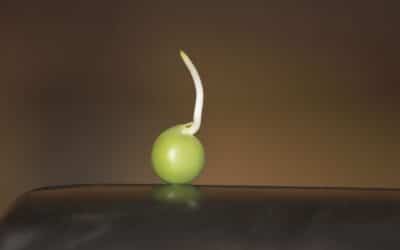The repercussions of illegal seed sales can be wide ranging including impacting future varietal development.
Picture this, flashback to seeding time last year. You’re busy putting your wheat crop in the ground, at the time you’re using certified seed you bought from your local seed grower. You made your calculations and thought you had enough seed, but just before the end of the field with a few acres left, you run out.
You text your neighbour who you know has the same wheat variety seed asking if you can buy a few pounds from them? You think nothing of it because you just need a little more seed to plant those final few acres. They text back that they do, so you jump in your truck and drive over to their farmyard and pick up the seed. An hour later you’re back in your tractor seeding those final acres. No harm no fowl, right? Actually, that’s not the case. What you just did was an illegal seed sale commonly called a brown-bag seed sale.
“There’s two components to seed. There’s the physical seed itself that’ll grow a plant, but with that seed there’s the intellectual property and the breeder has the exclusive rights,” Chris Churko, CEO of FP Genetics, explains in a phone interviews. “That intellectual property carries with that variety, no matter where it goes. When people look at seed, they just look at seed as something that will grow a plant, but in reality, if it’s a protected variety, that intellectual property is always there.”
It varies on what counts as an illegal or brown-bag seed sale. It can be the above example of buying extra seed from a neighbour or as straight out as buying seed you find advertised by a non-certified seed grower. Brown-bagging seed sales are when someone takes a crop variety protected by Plant Breeders’ Rights (PBR) and sells the seed, explains Anthony Parker, commissioner of plant breeders’ rights in Canada. This is different from farm saved seed where a farmer uses seed they grew from one of their previous crops, which is legal. Brown-bag sales are illegal seed sales to other farmers, as opposed to purchasing seed from an authorized retailer. It most commonly happens with cereal crop varieties such as wheat, barley and oats.
“The purpose of Plant Breeders’ Rights is to try to stimulate investment in innovation in plant breeding. And it does so by providing specific private rights to the breeder, much like an inventor seeks patent protection. So, they can have exclusivity over their invention, no one else can use it but them unless that person has been authorized,” Parker says in a phone interview.
When seed is illegally sold via brown-bag sales, it impacts the whole seed chain, from the breeding lab to farmers’ fields. At the plant breeding level, it reduces income plant breeders receive from sales of certified seed, as those profits are what plant breeders use to fund work to breed future varieties. At the seed grower level, it impacts the number of sales they’re able to make which can lessen the amount of seed they grow in future years reducing the amount of new varieties available to farmers.
“When someone is selling brown-bag seed, they’re essentially free riding off of someone else’s innovation. That farmer did not put the 10 to 12 years in breeding efforts to create that great new variety. They just essentially stole someone else’s IP and made money off of it. So, you’ve denied an opportunity for the breeder to recover some of their costs,” Parker explains.
These sales also impact seed companies’ willingness to invest or partner with research institutions for new varietal development. Churko says it also impacts taxpayer dollars. The largest plant breeder in Canada is Agriculture and Agri-Food Canada (AAFC), which means when brown-bag seed sales happen on AAFC varieties then taxpayers are left paying more for future varietal development to make up for those lost profits.
“If it was a healthy system, and everybody that purchases a new variety pays that small amount for the use of that intellectual property, the entire weight to the system sort of comes down. And so there actually ends up being more money available to move it all forward,” Churko explains.
The exact volume of brown-bag sales happening in Canada is unknown, but previous studies have estimated it at as high as 20 per cent of cereal seed sales nationally, Parker says. This is higher than in comparable regions such as the European Union or Australia.
“Think about that. Could an author succeed if 20 per cent of the books that they sold were illegal books?” he adds. “It’s nearly impossible to succeed if the level of illegal, uncompensated sales are that high.”
Seeds Canada does do an annual market survey with seed companies to track the legal seed sales market, says Churko, who is a Seeds Canada board member and chair of the business services steering committee. From there Seeds Canada will compare seed sale numbers with data available from crop insurance stating insured crop acres. It isn’t a foolproof way to track illegal sales, but it does allow Seeds Canada to have an overview of what the situation is year to year, Churko adds.
“We certainly noticed that there can be significant swings in the use of certified seed in years where the condition of the crop coming off is relatively good. And so, we’ve been anticipating germination on a commercial harvest is reasonably well,” he explains. “We just noticed that the impact to certified sales, which do put money back into that investment structure, can take a significant hit in years where quality is good. We also noticed that certified seed sales jumped considerably in years where we expect quality to be bad.”
While Seeds Canada doesn’t have confirmed data on illegal seed sales, there are instances where they’re confident it has happened. One instance is with a durum wheat variety commercially released in 2012. The variety had strong resistance to Fusarium compared to other varieties on the market. At the time, a small amount of seed was released. In 2016 it became the top durum variety grown in Western Canada based on crop insurance data.
“Which sounds like a success story, and for farmers it’s a success story,” Churko says. “Certainly, a clear benefit downstream for the value chain because you’ve got a better product. And so, while it’s been the highest growing insured acres, because that’s where we get to see the actual varieties year by year, as a seed product we can’t claim it to be really a success.”
While it was the top durum variety grown in 2016, only 22 per cent of those acres planted were from certified seed. Since its launch in 2012 to 2022, there has been about 16 million acres of it planted across Western Canada, and only seven per cent of those acres have been planted using certified seed. Some of those non-certified seed acres would be from farmer saved seed, but Churko says based on the information available it suggests the use of brown-bag seed has been large.
“When we look at the flow of royalties, this variety, which has been seeded on the largest number of acres for the class in the past decade, has not made a return on investment for the breeder — and that’s significant,” Churko says.
When caught making illegal seed sales, there are legal repercussions. In the PBR Act there’s a section called remedies which outlines what a title holder or plant breeder can do to stop infringements, like brown-bag sales, from occurring, Parker explains. Title holders can take civil action against those doing the illegal sales to seek compensatory damages for the harm that has been done — this can be a lengthy and costly process to undertake.
“If a breeder has to spend that money on enforcing the rights because someone stole their variety and profited from, it means that’s not that’s money that’s being spent on breeding and developing better varieties,” Parker says.
He adds this time-consuming process through the civil court system continues to add harm as it takes away from time that could be spent developing new varieties.
Related Articles
PGDC is Working for the Farmers When it Comes to Crop Varieties







